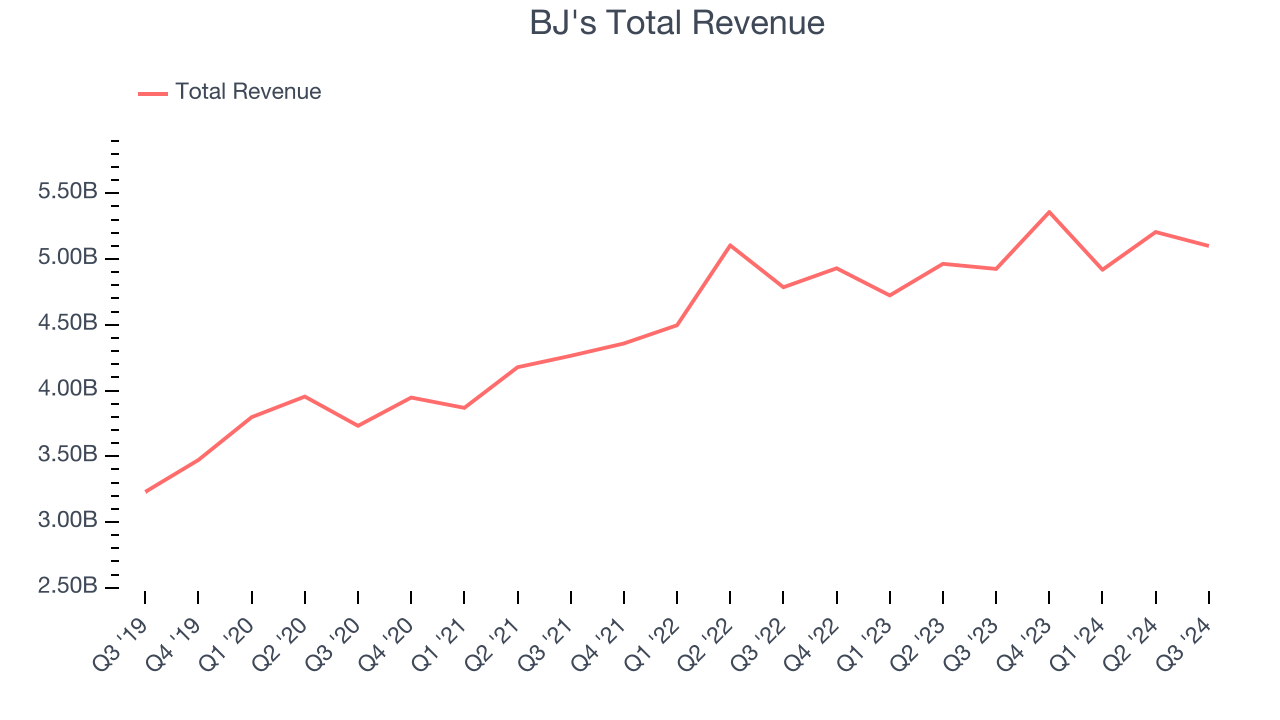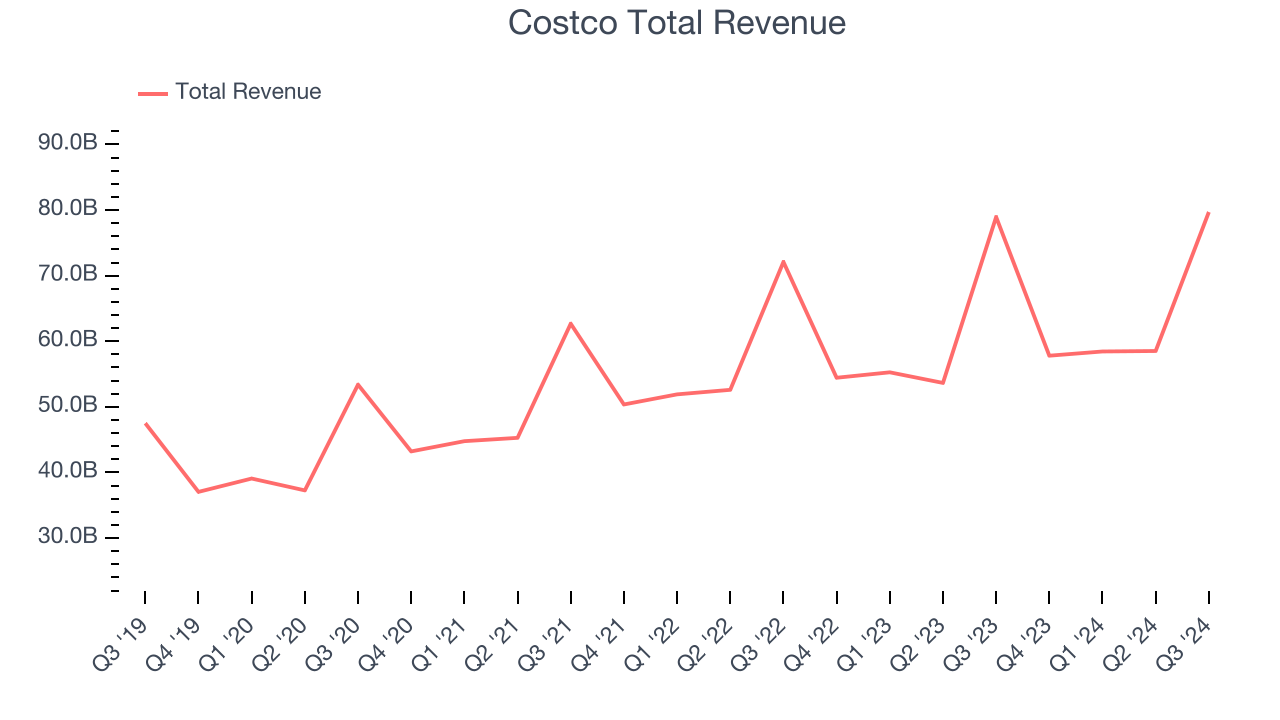
Looking back on large-format grocery & general merchandise retailer stocks’ Q3 earnings, we examine this quarter’s best and worst performers, including BJ's (NYSE: BJ) and its peers.
Big-box retailers operate large stores that sell groceries and general merchandise at highly competitive prices. Because of their scale and resulting purchasing power, these big-box retailers–with annual sales in the tens to hundreds of billions of dollars–are able to get attractive volume discounts and sell at often the lowest prices. While e-commerce is a threat, these retailers have been able to weather the storm by either providing a unique in-store shopping experience or by reinvesting their hefty profits into omnichannel investments.
The 4 large-format grocery & general merchandise retailer stocks we track reported a mixed Q3. As a group, revenues were in line with analysts’ consensus estimates.
In light of this news, share prices of the companies have held steady as they are up 4.3% on average since the latest earnings results.
Best Q3: BJ's (NYSE: BJ)
Appealing to the budget-conscious individual shopping for a household, BJ’s Wholesale Club (NYSE: BJ) is a membership-only retail chain that sells groceries, appliances, electronics, and household items, often in bulk quantities.
BJ's reported revenues of $5.10 billion, up 3.5% year on year. This print was in line with analysts’ expectations, and overall, it was a strong quarter for the company with a solid beat of analysts’ EBITDA estimates and an impressive beat of analysts’ EPS estimates.
“Our third quarter results demonstrate the combination of great value and strong execution. We delivered robust membership growth and hit a milestone of 7.5 million members. Our value proposition continues to resonate in new and existing markets,” said Bob Eddy, Chairman and Chief Executive Officer, BJ’s Wholesale Club.

Interestingly, the stock is up 12.1% since reporting and currently trades at $96.
Is now the time to buy BJ's? Access our full analysis of the earnings results here, it’s free.
Costco (NASDAQ: COST)
Designed to be a one-stop shop for the suburban consumer, Costco (NASDAQ: COST) is a membership-only retail chain that sells groceries, apparel, toys, and household items, often in bulk quantities.
Costco reported revenues of $79.7 billion, flat year on year, in line with analysts’ expectations. The business had a satisfactory quarter with an impressive beat of analysts’ gross margin estimates.

The market seems happy with the results as the stock is up 9% since reporting. It currently trades at $982.85.
Is now the time to buy Costco? Access our full analysis of the earnings results here, it’s free.
Weakest Q3: Target (NYSE: TGT)
With a higher focus on style and aesthetics compared to other large general merchandise retailers, Target (NYSE: TGT) serves the suburban consumer who is looking for a wide range of products under one roof.
Target reported revenues of $25.67 billion, up 1.1% year on year, falling short of analysts’ expectations by 0.9%. It was a disappointing quarter as it posted full-year EPS guidance missing analysts’ expectations.
Target delivered the weakest performance against analyst estimates in the group. As expected, the stock is down 17.1% since the results and currently trades at $129.34.
Read our full analysis of Target’s results here.
Walmart (NYSE: WMT)
Known for its large-format Supercenters, Walmart (NYSE: WMT) is a retail pioneer that serves a budget-conscious consumer who is looking for a wide range of products under one roof.
Walmart reported revenues of $169.6 billion, up 5.5% year on year. This print topped analysts’ expectations by 1.8%. It was a strong quarter as it also produced a solid beat of analysts’ gross margin and EPS estimates.
Walmart scored the biggest analyst estimates beat and fastest revenue growth among its peers. The stock is up 13.4% since reporting and currently trades at $95.33.
Read our full, actionable report on Walmart here, it’s free.
Market Update
In response to the Fed's rate hikes in 2022 and 2023, inflation has been gradually trending down from its post-pandemic peak, trending closer to the Fed's 2% target. Despite higher borrowing costs, the economy has avoided flashing recessionary signals. This is the much-desired soft landing that many investors hoped for. The recent rate cuts (0.5% in September and 0.25% in November 2024) have bolstered the stock market, making 2024 a strong year for equities. Donald Trump’s presidential win in November sparked additional market gains, sending indices to record highs in the days following his victory. However, debates continue over possible tariffs and corporate tax adjustments, raising questions about economic stability in 2025.
Want to invest in winners with rock-solid fundamentals? Check out our Hidden Gem Stocks and add them to your watchlist. These companies are poised for growth regardless of the political or macroeconomic climate.
Join Paid Stock Investor Research
Help us make StockStory more helpful to investors like yourself. Join our paid user research session and receive a $50 Amazon gift card for your opinions. Sign up here.




